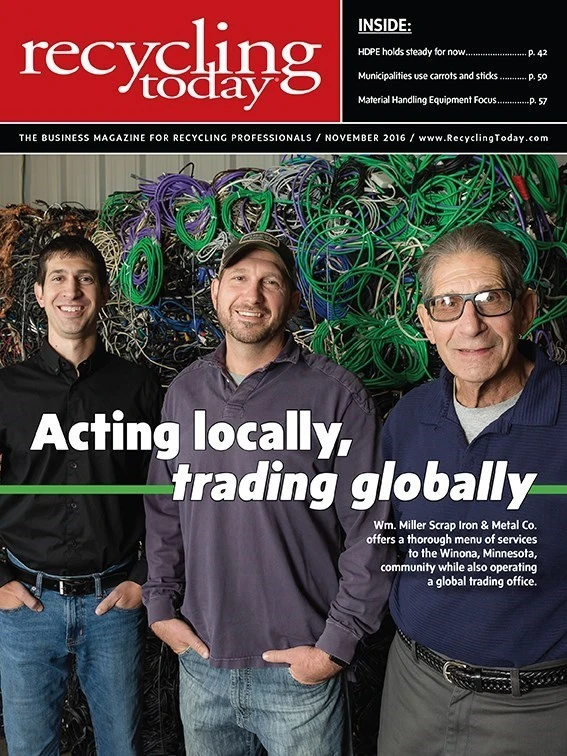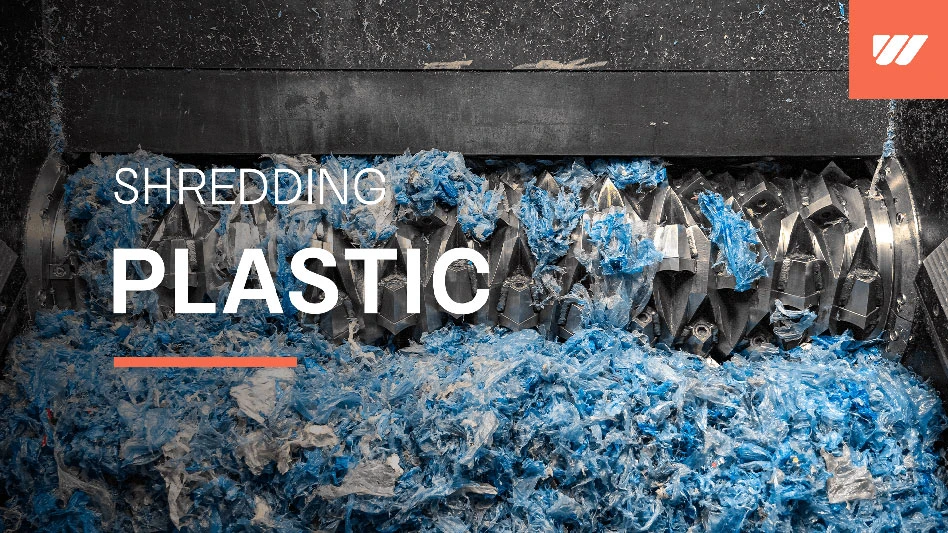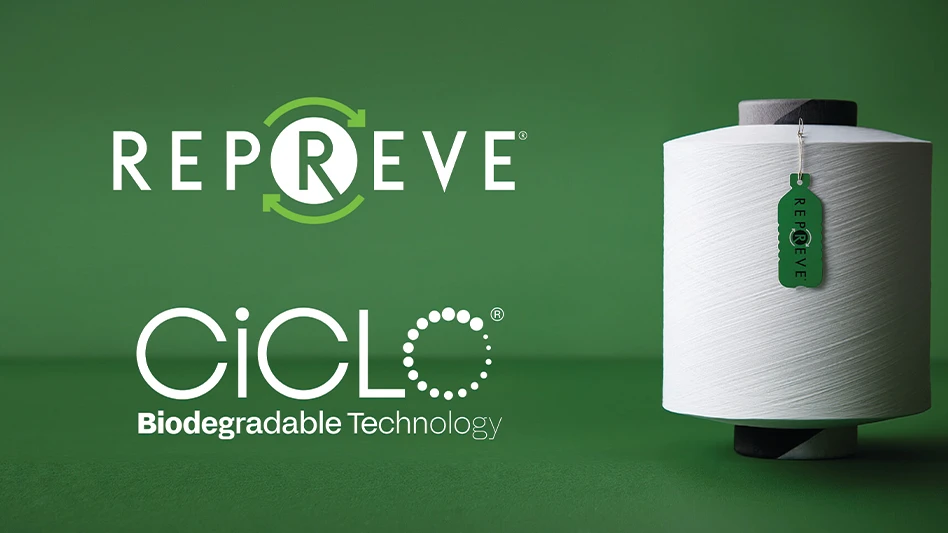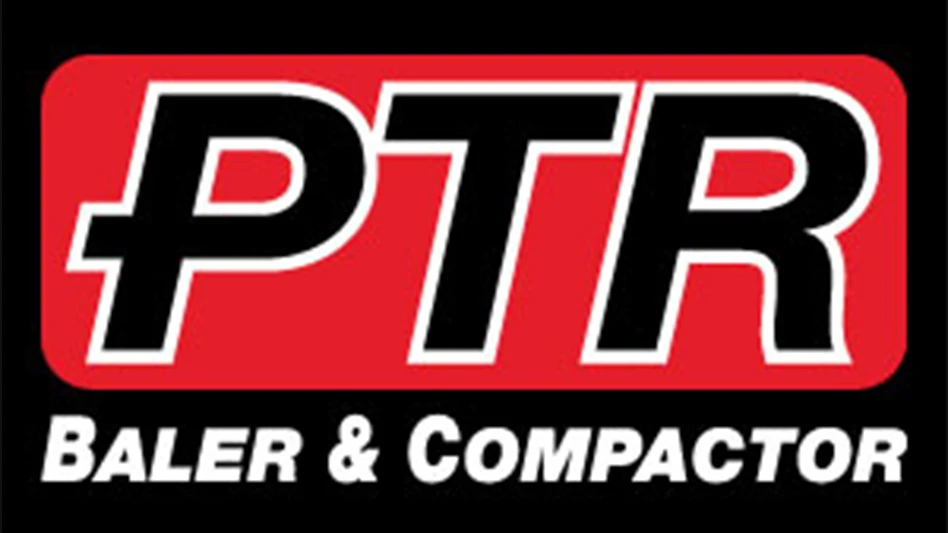
The family business owners of Wm. Miller Scrap Iron & Metal Co., based in Winona, Minnesota, have maintained a sharp focus on the needs of customers in their home town, but that focus has not been at the expense of refusing to get involved in the wider world of scrap trading.
Jeremy Miller, a fourth-generation family company manager and current chief financial officer (CFO), says the company operates a “full-service scrap recycling and processing facility” in Winona that goes well beyond handling metals. Materials sought by the firm include mixed solid waste, construction and demolition (C&D) materials, electronic scrap, cardboard, paper and some plastics. “We try to be a one-stop recycling and waste facility for our customers and suppliers,” Jeremy says.
At the same time the company has provided this depth of service to Winona and surrounding parts of southeastern Minnesota, Miller Scrap has established a nonferrous scrap brokerage business that serves as a full-time connection to the consuming markets of Asia.
The two-pronged business model has helped diversify the family company’s revenue stream in an industry known for a cyclical nature that can be perilous.
Rolling into Minnesota
Miller Scrap, like many recycling companies with decades-long histories, can trace its roots back to an individual who collected discarded materials as a way to follow an entrepreneurial path.
The company’s origins are linked to when Louis Miller immigrated to Winona from Russia in the early 1900s and formed Consumers Tire & Supply Co. That firm mainly sold tires, but Louis also purchased rags, paper and scrap metal to be sold for recycling purposes. (In the company’s earliest years, most of the tires were being sold to horse-and-wagon operators rather than to car and truck owners.)
It was not until 1950 that Louis’ son William and his wife, Esther, separated from Consumers Tire & Supply and formed Miller Salvage and Supply, based on West Second Street in Winona.
Miller Salvage changed its name to Wm. Miller Scrap Iron & Metal in 1955 and continued in the ferrous and nonferrous scrap business.
Several members of the Miller family spanning four generations have provided guidance to the overall family business, with a common trait among them being a willingness to take risks to protect and grow the business.
Founder Louis was one of four Miller brothers but one of only two who settled in Winona with the goal of starting their own businesses.
His son William made the decision in 1950 to concentrate on metal recycling. Unfortunately, William died at a relatively young age, while his oldest two sons were still in college and the other was in high school. However, William’s widow, Esther, made a firm commitment to stay in Winona to keep the business open and ready for future management by her sons.
“My mother stepped in, and this was a time when very few women were in the scrap business,” recalls Jerry. “She was a tough, smart lady, and she held on and saved the business for her boys. She decided to continue on rather than move to the Twin Cities with other family and, because of that decision and her hard work and efforts, our company is still here today.”
Jerry says Esther was deeply involved in the community and the recipient of leadership and women-in-business awards in the 1970s and 1980s. “She was known and liked in the community and was known for her saying, ‘My hands may be dirty but my money is clean,’” he says.
As they finished their educations, Jerry and his brothers, Stewart and Morrie, became the third Miller generation to lead the family business. Stuart and Morrie have subsequently passed away, while Jerry remains involved as president and chairman of Miller Scrap.
Part of Jerry’s legacy has been to prepare his sons Jeremy and Willie as the fourth generation leaders of Miller Scrap. Jeremy currently serves as CFO, while Willie is the chief operating officer (COO) of the firm.
Another part of Jerry’s legacy has been the significant diversification moves Miller Scrap has made over the decades. In the early 1960s, Miller Scrap expanded into the refuse and roll-off dumpster business and opened what it calls a mixed solid waste (MSW) transfer station.
Jerry says a cold call from the owner of a Twin Cities-based solid waste company prompted him to take the (for a metals company) unorthodox step.
He says Joey Polansky, who also marketed roll-off containers and other waste-related equipment, offered to let him try out the equipment without a down payment if he could run routes serving customers in the Winona area.

“He just showed up one day, just as I was about to leave to play handball,” Jerry recalls. “A couple of days later, I was on my way to Minneapolis to see what he was doing, and a couple of days after that he convinced me that since the landfill was about 6 miles outside of Winona, we should open a transfer station so the public could dump trash there rather than driving out to the landfill,” he adds.
Growth in both business sectors has caused Miller Scrap to relocate some of its operations in the ensuing decades. In the early 1970s, Miller Scrap purchased 10 acres of industrial land from the Winona Port Authority and moved its scrap metal operations and the MSW transfer station to the property, which is in eastern Winona near the banks of the Mississippi River.
The Miller operations have remained at that location, now managed in part by the fourth generation of the Miller family and staffed by about 20 employees in total.
Diversifying for diverse reasons
The chain of events that led Jerry to get into the solid waste business provides just one example of the willingness of Miller Scrap’s leadership team to diversify the company.
Several members of the Miller family spanning four generations have provided guidance to the overall family business, with a common trait among them being a willingness to take risks to protect and grow the business.
Under Jerry’s leadership, and recently in cooperation with Jeremy and Willie, Miller Scrap has consistently found ways to broaden services to existing customers and to serve new ones.
The company’s foray into the solid waste sector in the 1960s facilitated its subsequent entry into the C&D materials market.
Miller Scrap operates a C&D materials transfer station that also serves a recycling purpose. Jeremy says, “Materials like wood, concrete, OCC (old corrugated containers) and metal are sorted from the refuse and demo scrap for further recycling.”
Its transfer station experience also has provided Miller Scrap with sufficient knowledge of the scrap paper markets that the firm can provide paper recycling services, including for OCC and office paper, to its wider client base.
Metals-related opportunities also have been followed up on, including the handling of electronic scrap and a nonferrous brokerage business that emanates well beyond the Winona region.
On the electronic scrap front, Miller Scrap has obtained R2 (Responsible Recycling) certification as a step toward increasing its presence in the collection and processing of discarded computers and related equipment. (The company also is RIOS, or Recycling Industry Operating Standard, certified.)
The R2 standard has been designed “to provide a common set of processes, safety measures and documentation requirements for businesses that repair and recycle used electronics,” according to Sustainable Electronics Recycling International (SERI), the nonprofit organization that serves as the housing body for the R2 standard.
Geographically, Miller Scrap has found a way to branch out by providing global brokerage services for a select group of nonferrous scrap grades.
“In 2011, we developed some key partnerships in Asia that helped open the doors to a trading and brokerage division,” Jeremy says. “Currently, over 40 percent of our overall sales are generated from our trading and brokerage division, which includes some domestic but mostly global sales.”
While in Winona, Miller Scrap does its “very best to be a one-stop shop and offer many different services locally,” he says. “When it comes to our brokerage and trading division,” Jeremy continues, “we take the opposite approach and have a narrower focus on specific material. Our niche market includes lower grade No. 2 insulated copper wire (ICW)—usually 50 percent and lower—harness wire from automobiles, copper yokes, along with some plastics and certain grades of aluminum.”
The company’s broad service portfolio is one source of distinction for Miller Scrap, but another involves the level of community, political and industry involvement sustained by the firm.
Plain to see
Scrap recycling firms have been known to struggle with the idea of maintaining a visible profile in their communities, with some company managers opting to “stay under the radar” to avoid scrutiny.
The Miller family has seemingly had no such struggle, with Jerry having served as Winona’s mayor for more than 15 years and Jeremy currently serving in Minnesota’s state senate. (See the sidebar “Service of the Public Variety”.)
Beyond the visible forays into politics, Miller Scrap and its employees also have taken on roles in community and industry organizations in Winona and beyond.
Jeremy, in addition to his considerable management responsibilities and being the married father of three young sons, still manages to provide a foremost example of the firm’s community involvement.
He serves on the President’s Advisory Council at Minnesota State College-Southeast Technical and is a director of the Winona State University Warrior Club and Saint Mary’s University Athletic Advisory Board. Jeremy also is a member of the Winona Area Chamber of Commerce and serves as vice president of the Morrie Miller Athletic Foundation, a Winona-based foundation (named for Jerry’s late brother) that supports youth sports and other activities.
Within the recycling industry, Jeremy is chairman of the Global Recycling Standards Organization, which oversees the RIOS certification system. He also is a member of the Institute of Scrap Recycling Industries (ISRI) planning committee at the national level.
The Miller family members say they can maintain such visibility in part because they strive to run a company that treats its customers and employees in a fair and even-handed fashion and that can stand up to scrutiny.
Regarding employees, Jeremy says, “We put a strong emphasis on taking care of our employees and community. We offer competitive wages and unmatched benefits, including fully paid group health and dental insurance and a matching 401(k) retirement plan.”

With the exception of some of its nonferrous scrap brokerage clients, the rest of Miller Scrap’s customers are essentially neighbors, Jeremy says. “Our processing facility in Minnesota mostly services about a 100-mile radius, but the bulk of the material is from 50 miles or closer.”
Maintaining customer relations therefore is also an exercise in community relations. “Miller Scrap is very customer and supplier focused,” Jeremy says. “We strive to meet the needs of our customers and suppliers by being agile and available. We provide our local customers with one-stop recycling and waste solutions so they only have to make one call. Instead of saying ‘no,’ we do our best to get to ‘yes,’” he adds.
“While our facility, processes and procedures have seen a lot of innovation over the years,” Jeremy continues, “we still operate with an ‘old school’ mentality. The owners work side by side with the rest of our team, and when the telephone rings, you get an answer. While we do have email, we do not have office voicemail or an answering service. We do our very best to make it happen.”
The “make it happen” phrase is one that Jeremy is incorporating into his management procedures, with a weekly “Make it Happen” email designed to focus on “the importance of building strong relationships, self-motivation, effective communication and focusing on positive outcomes,” he says.
“It’s extremely important for us to do everything we can to work together with our customers and suppliers to find positive solutions for their recycling and waste needs,” Jeremy continues. “It’s not about what is the easiest solution; rather we focus on what is the best solution to meet their needs.”
Jerry and Jeremy are aware of the scrap processing consolidation going on around them, but both say they are working and planning toward an independent future for the company. “Hopefully the fifth generation is coming up,” Jerry says, referring to his young grandsons and granddaughter.
Jeremy concludes, “Sometimes we feel like a David among Goliaths. We realize, though, that we can compete with just about anybody in the country, and at the same time we’re small enough to provide that individual and very focused service. That’s very important to us.”

Explore the November 2016 Issue
Check out more from this issue and find your next story to read.
Latest from Recycling Today
- Recyclers likely to feel effects of US-China trade war
- BCMRC 2025 session preview: Navigating battery recycling legislation and regulations
- Yanmar Compact Equipment North America appoints new president
- LYB publishes 2024 sustainability report
- Plum Creek Environmental acquires Custom Installation LLC
- Avis introduces Harris American Co.
- International Paper in talks to divest 5 European box plants
- Recycled PP from Polykemi, Rondo Plast used in flood protection product






